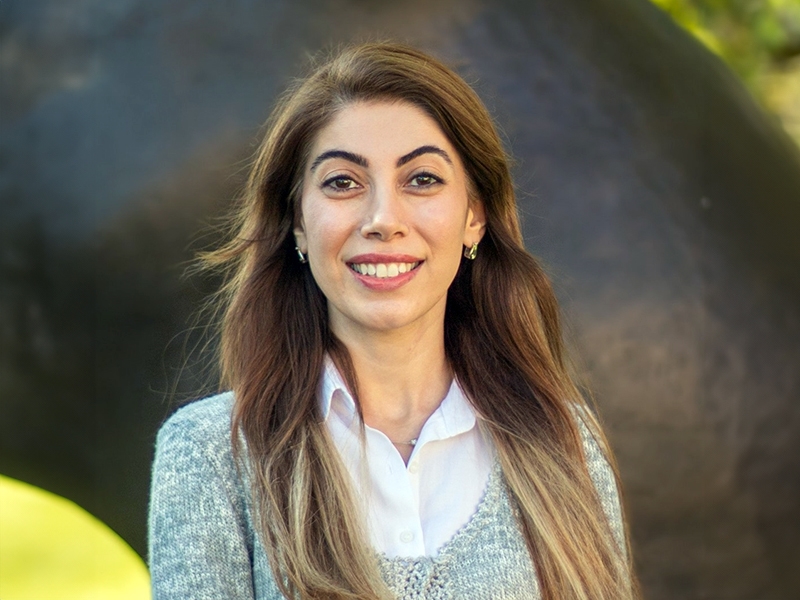
As the global population grows, food scientists like Samira Feyzi are exploring the world of plant proteins to broaden their use in human nutrition.
Feyzi recently joined the Arkansas Agricultural Experiment Station as an assistant professor of food science specializing in protein chemistry and analysis research. She will conduct research through the experiment station, the research arm of the U of A System Division of Agriculture, and teach courses through the Dale Bumpers College of Agricultural, Food and Life Sciences.
"I'm interested in plant proteins because there is a real space to enrich this field," Feyzi said. "There is a demand for novel protein sources because of population growth, nutritional requirements, health aspects, environmental concerns and adding more diversity to the market."
However, she noted, "plant proteins should not be perceived as items that jeopardize the standing of animal-based proteins or foods on store shelves."
Alternative proteins, including plant proteins, carry different flavor and functionality than animal proteins, and they provide more variety to a consumer's diet and food products, Feyzi said. So, plant-based protein ingredients and products should be regarded as a "distinct category of protein source," separate from animal-based proteins and products.
Proteins are an essential part of a healthy, balanced diet. During digestion, proteins are broken down into chemical building blocks called amino acids, which support muscle and bone development, regulate hormones and oxygenate blood. However, not all plant protein sources are created equal. Proteins from meats, dairy, plants and fungi vary in their responses to food processing because of differences in their amino acid sequence, protein composition and structural features. That is why functionalities differ even among the same category of plant proteins like legumes, Feyzi said.
For example, Feyzi previously conducted research that will soon be published showing how various soybean varieties bred to adapt to climate change offer proteins that differ in quality and functionality. Some offer proteins that would be better suited for drinks, such as alternative kinds of milk, and others provide better properties to use in the formation of meat analogs, also known as meat alternatives or substitutes and include things like black bean burger patties. On a related note, Feyzi investigates the off-flavor profiles of various plant protein sources to find the potential to offer fewer off-flavors.
Her research also delves into plant protein modification using different non-thermal and enzymatic methods to enhance their functionality for food applications like meat analogs. Moreover, part of her research focuses on amino acid profile analysis, protein digestibility and identifying anti-nutrient compounds to produce novel plant protein ingredients with higher protein quality.
"With the addition of Dr. Feyzi's expertise in protein chemistry, along with recent hires and our established programs like the Rice Processing Program and Sensory Science Center, we now have a core group to establish a strong program on alternate proteins," said Jeyam Subbiah, head of the Food Science Department. "I am confident that they will make a significant impact in this field and bring recognition to our department."
The recent hires Subbiah reference include Sun Ferreira, whose expertise is in food processing, and Mahfuzur Rahman, who has expertise in grain processing.
Subbiah said Feyzi will assist the current instructors of food analysis in the spring and food chemistry in the fall and work on developing a graduate-level food chemistry course to be offered next year.
Feyzi earned her bachelor's, master's and doctoral degrees from Ferdowsi University of Mashhad, Iran. As a visiting doctoral student at the University of Naples Federico II, she extended her research on the interactions of proteins as fat replacers with aroma compounds and their effect on aroma release. She went on to serve as a post-doctoral researcher for three years with the Plant Protein Innovation Center at the University of Minnesota, where she developed her skills in analytical plant protein chemistry and modification. Feyzi also worked as a lecturer on food chemistry, food analysis and food engineering courses in Iran and Minnesota.
To learn more about Division of Agriculture research, visit the Arkansas Agricultural Experiment Station website: https://aaes.uada.edu. Follow on Twitter at @ArkAgResearch. To learn more about the Division of Agriculture, visit https://uada.edu/. Follow us on Twitter at @AgInArk. To learn about extension programs in Arkansas, contact your local Cooperative Extension Service agent or visit www.uaex.uada.edu.
About the Division of Agriculture: The University of Arkansas System Division of Agriculture's mission is to strengthen agriculture, communities, and families by connecting trusted research to the adoption of best practices. Through the Agricultural Experiment Station and the Cooperative Extension Service, the Division of Agriculture conducts research and extension work within the nation's historic land grant education system.
The Division of Agriculture is one of 20 entities within the University of Arkansas System. It has offices in all 75 counties in Arkansas and faculty on five system campuses.
The University of Arkansas System Division of Agriculture offers all its Extension and Research programs and services without regard to race, color, sex, gender identity, sexual orientation, national origin, religion, age, disability, marital or veteran status, genetic information, or any other legally protected status, and is an Affirmative Action/Equal Opportunity Employer.
Topics
Contacts
John Lovett, project/program specialist
Agricultural Communication Services
479-763-5929,